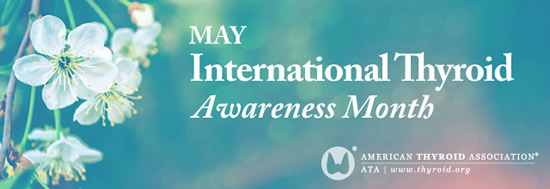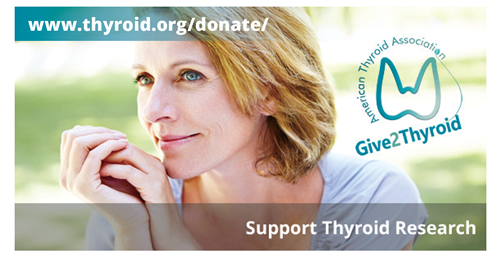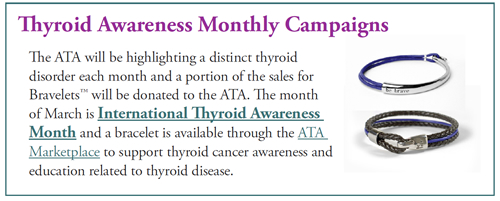Clinical Thyroidology for the Public summarizes selected research studies discussed in the previous month’s issue of Clinical Thyroidology, an official publication of the American Thyroid Association. Editor-in-chief, Alan Farwell, MD, FACE
Volume 12 Issue 5
Available in pdf format for saving and printing and Web page format for viewing online
PDF Format for Saving and Printing
Clinical Thyroidology for the Public Volume 12 Issue 5 (PDF file, 5.99 MB)
TABLE OF CONTENTS – Web Format
IODINE DEFICIENCY Iodine content is low or absent in some US multivitamin and prenatal vitamin brands
Iodine is essential for the production of thyroid hormone and for normal development of the baby during pregnancy. It has been reported that only 60% of the different types of prenatal multivitamin supplements marketed in the US list iodine among the ingredients. This study aimed to assess whether multivitamins are a significant source of iodine by looking at the iodine content reported in the most frequently purchased US adult and prenatal multivitamin preparations.
Patel A et al 2018 Iodine content of the best-selling United States adult and prenatal multivitamin preparations. Thyroid. Epub 2018 Oct 30. PMID: 30266075.
(PDF File for saving and printing, 227 KB)
THYROID AND PREGNANCY Pregnancy and perinatal outcome among hypothyroid mothers
Hypothyroidism is common in women of reproductive age and has known adverse effects on pregnancy. This study took advantage of national registries in Finland where nearly all women receive free maternity care and deliver at national hospitals and data is collected. The goal of the study was to look at pregnancy complications in a large group of patients and evaluate whether consistent use of thyroid hormone in hypothyroid mothers affected the outcomes.
Turunen S et al Pregnancy and perinatal outcome among hypothyroid mothers: a population-based cohort study. Thyroid 2019 29:135–141
(PDF File for saving and printing, 117 KB)
HYPERTHYROIDISM Treatment of hyperthyroidism resulting in hypothyroidism decreases the risk of heart disease related hospitalization and death risk
Thyroid hormone has major effects on the heart and hyperthyroidism can cause major problems and symptoms such as irregular heart rhythms and palpitations. Despite treatment, the negative effects related to hyperthyroidism may persist. This study examined the effect of radioactive iodine therapy and surgery on heart disease related problems, hospitalizations and mortality.
Essi et al 2018 Cardiovascular morbidity and mortality after treatment of hyperthyroidism with either radioactive iodine or thyroidectomy. Thyroid 28:1111–1120. Epub 2018 Jul 23.
(PDF File for saving and printing, 167 KB)
HYPOTHYROIDISM Levothyroxine treatment increases mortality in patients with heart failure
It is well known that overt hypothyroidism has negative effects on the heart function that improve with levothyroxine treatment. While levothyroxine replacement may improve heart failure, it is possible that in this group it could have harmful effects, especially if the levothyroxine dose is too high. This study evaluated the long-term effects of levothyroxine therapy in patients with heart failure.
Einfeldt MN 2018 Long-term outcome in heart failure patients treated with levothyroxine: an observational nationwide cohort study. J Clin Endocrinol Metab. Epub 2018 Dec 4. PMID: 30517746.
(PDF File for saving and printing, 287 KB)
THYROID CANCER Active surveillance for low risk papillary thyroid cancer can be considered in select patients
Active surveillance involves closely monitoring the thyroid cancer over time, instead of treating it with immediate surgery. Prior studies have shown that active surveillance is safe in papillary thyroid cancers measuring 1 cm or smaller and confined to the thyroid without any lymph node involvement or spread outside of the neck. This study compared outcomes of active surveillance for patients with cancers <1 cm to those with larger cancers (1-2 cm).
Sakai T et al 2019 Active surveillance for T1bN0M0 papillary thyroid carcinoma. Thyroid 29:59–63. Epub 2019 Jan 8. PMID: 30560718.
(PDF File for saving and printing, 287 KB)
THYROID CANCER The TIRADS ultrasound system can decrease unnecessary biopsies of PET-positive thyroid nodules
Occasionally, PET scanning will identify unexpected/previously undetected thyroid nodules. Since ~1/3 of PET-positive thyroid nodules will end up being thyroid cancer, most experts recommend biopsy of these nodules. The purpose of this study is to determine if the TIRADS ultrasound system can predict the absence of thyroid cancer in previously undetected thyroid nodules identified during PET scanning and, thus, avoid thyroid biopsy.
Trimboli P et al 2018 Fine-needle aspiration in all thyroid incidentalomas at 18F-FDG PET/CT: can EU-TIRADS revise the dogma? Clin Endocrinol (Oxf ) 89:642–648. Epub 2018 Aug 6. PMID: 30019402.
(PDF File for saving and printing, 287 KB)






